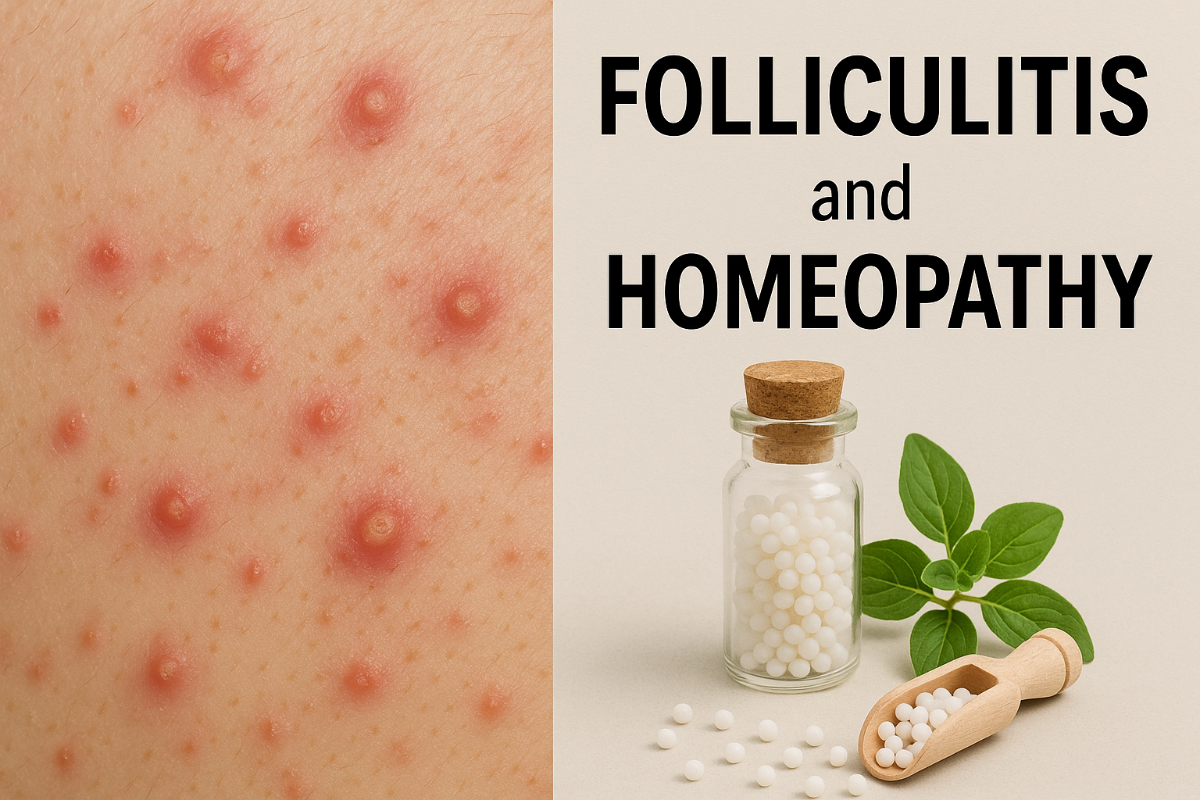
Folliculitis and Homeopathy: Natural Approaches to Hair Follicle Inflammation
Understanding Folliculitis
Folliculitis is a common skin condition characterized by inflammation of hair follicles. These small, red, and sometimes painful bumps can appear anywhere on the body where hair grows, but are most common on the face, scalp, armpits, back, chest, and groin. While typically not serious, folliculitis can be uncomfortable, persistent, and sometimes lead to more severe complications if left untreated.
Common Causes of Folliculitis
- Bacterial infections: Most commonly Staphylococcus aureus
- Fungal infections: Including yeast and dermatophytes
- Viral infections: Such as herpes simplex virus
- Physical irritation: From shaving, tight clothing, or excessive sweating
- Chemical irritation: From oils, tar, or certain skincare products
- Hot tub use: Sometimes called "hot tub folliculitis" caused by Pseudomonas bacteria
Conventional Treatments vs. Homeopathic Approaches
Conventional medicine typically treats folliculitis with antibacterial soaps, topical or oral antibiotics, antifungal medications, or corticosteroids depending on the cause. While effective for many, some individuals seek natural alternatives due to concerns about antibiotic resistance, medication side effects, or personal preference for holistic treatments.
Homeopathic Remedies for Folliculitis
Homeopathy is based on the principle of "like cures like" and uses highly diluted substances to stimulate the body's natural healing response. Here are some homeopathic remedies often suggested for folliculitis:
1. Hepar Sulphuris Calcareum
Indications: Particularly useful for painful, extremely sensitive folliculitis with yellow pus formation. May be recommended when the affected areas feel worse from cold and better from warmth.
Typical potency: 6C or 30C
2. Silicea (Silica)
Indications: Often suggested for slow-healing folliculitis with poor wound healing. May help when there's pus formation but the body struggles to expel it.
Typical potency: 6C or 30C
3. Belladonna
Indications: For folliculitis with sudden onset, intense redness, heat, and throbbing pain. The skin often appears bright red and feels hot to touch.
Typical potency: 30C
4. Calendula
Indications: Used both internally and as a topical application for its wound-healing and antiseptic properties.
Application: Available as tinctures, creams, or oils for external use, and in pellet form for internal use.
5. Berberis Aquifolium
Indications: Often recommended for chronic skin conditions with rough, scaly patches and pustules.
Typical potency: 6C or 30C
Complementary Natural Approaches
In addition to homeopathic remedies, these natural approaches may support skin health:
Dietary Considerations
- Anti-inflammatory foods: Incorporate omega-3 rich foods like fatty fish and flaxseeds
- Zinc-rich foods: Pumpkin seeds, oysters, and grass-fed beef support skin healing
- Vitamin A and E: Found in sweet potatoes, carrots, almonds, and sunflower seeds
- Probiotics: Support gut-skin connection through fermented foods or supplements
Topical Natural Treatments
- Tea tree oil: Dilute with a carrier oil (1:10 ratio) for its antimicrobial properties
- Aloe vera gel: For cooling, soothing relief
- Apple cider vinegar: Diluted as a cleansing rinse for affected areas
- Turmeric paste: Mixed with water or coconut oil for its anti-inflammatory properties
When to Seek Medical Care
While exploring homeopathic and natural treatments, it's important to recognize when conventional medical care is necessary. See a healthcare provider if:
- Folliculitis symptoms worsen or don't improve within a week
- The inflammation spreads or deepens
- You develop a fever
- The affected area becomes increasingly painful, swollen, or warm
- You have a compromised immune system
- You develop recurrent episodes of folliculitis
Conclusion
Homeopathy offers a gentle, individualized approach to treating folliculitis that may complement or, in some cases, provide an alternative to conventional treatments. As with any health condition, a balanced approach that considers both conventional and complementary medicine often yields the best results.
Remember that what works for one person may not work for another, and patience is key when using homeopathic remedies as they often work more gradually than conventional medications. Always communicate with your healthcare providers about all treatments you're pursuing to ensure coordinated, safe care.
Disclaimer: This article is for informational purposes only and does not constitute medical advice. Always consult with qualified healthcare professionals before starting any new treatment regimen.
Conclusion
it may be a persistent issue, but with a holistic approach like homeopathy, you can target not only the symptoms but also the underlying imbalances in your body. Combined with a healthy lifestyle and good hair hygiene, homeopathy can be a powerful ally in your journey to a flake-free scalp.
Note: This blog provides general information and is not intended as medical
advice. Always consult healthcare professionals before starting any new treatment
approach for folliculitis or any other health condition
Call to Action:
Want to BE FREE FROM folliculitis ? Schedule a consultation today
at Sahitya Saraswati Holistic Homeopathic Clinic!
#Homeopathy #Holistic Healing